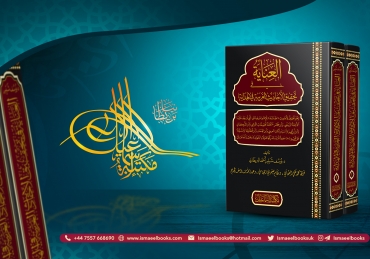What should a Muslim student study?
By Imam Ibn al-Sunnī (d. 364/975)
بسم الله الرحمن الرحيم
On a recent visit to Bahrain, my respected father Mufti Shabbir Ahmad (b. 1376/1957 – ) was given copies of Riyāḍat al-Mutaʿallīmīn, a book recently published by Shaykh Nizam Yaquby (b. 1378-9/1959 – ). The author of the book is Imam Ibn al-Sunnī (d. 364/975) who is famously known for his book ʿAmal al-Yawm Wa al-Laylah (Days and nights of the Prophet ﷺ), which has been described by Ḥajī Khalīfah (d. 1067/1657) in Kashf al-Ẓunūn (2: 1172) as the most comprehensive book on this subject. Imam Ibn al-Sunnī mastered the ḥadīth sciences and was also an expert on jurisprudence. Indeed, he served as the Judge of Rayy for some time. Thus, any book that is authored by a person of his calibre interests students of knowledge. I had heard about the book Riyāḍat al-Mutaʿallīmīn three months ago from Muḥaddith al-ʿAṣr Shaykh Muḥammad Yūnus Jownpūrī (d. 1355/1936 – ) who praised it and explained that he had incorporated some of its contents into his footnotes of Ṣaḥīḥ al-Bukhārī. The book is indispensable and beneficial especially for students of knowledge. Imam Ibn al-Sunnī outlines the etiquettes and guidelines for students and teachers, the methods of teaching and learning, and the different sciences that should be acquired. A salient feature of the book is that the Imam has succinctly outlined approximately three hundred educational principles and substantiated each principle with one or more ḥadīth through his chain of transmission. Towards the end of the book, he has outlined the different sciences a person should study and the sequence that should be followed. A translation of some of these principles is outlined below for the benefit of readers.
- Memorisation of the Qurʾān – Imam Ibn al-Sunnī writes, “So the first thing a person must begin to learn is the Qurʾān.” He further writes, “When he starts to learn the Qurʾān, he should learn between two and five verses so that he perfects his memorisation.” “Then he should increase it to three verses.” “When he has continued this, then he should increase it to five verses.” “If his memory is strong, then ten verses.” He also writes, “Reciting by turns in a group aids the memorisation of the Qurʾān” and “the best time of the day’s lesson is after Fajr Ṣalāh.”
- Understanding the Qurʾān – He writes, “Then he should acquire the knowledge and meaning of the Qurʾān”.
- Ḥadīth and Sunnah – He writes, “Then the study of the Qurʾān should be followed by the ḥadīths of the messenger of Allah ﷺ, as it is a compendium of wisdom.” He further writes, “He who intends to memorise the ḥadīths should begin with the narrations regarding the fundamentals of faith.” He further writes, “He should hasten to travel in the pursuit of ḥadīths to acquire the chains of transmission.”
- Inheritance – He writes, “When he has acquired his share from the narrations of the messenger of Allah ﷺ, he should acquire the knowledge of inheritance, as it is one third of religious sciences, and it is relied on in the distribution of inheritance.”
- Jurisprudence – He writes, “When he has mastered his knowledge of inheritance, he should acquire jurisprudence, for therein is the knowledge of the lawful and unlawful, and also the protection of faith and worldly splendour.”
- Arabic Language – He writes, “Then the knowledge that follows jurisprudence is the knowledge of Arabic and syntax, as it is a tool for all the sciences.” He further writes, “He should also acquire his share of the science of unfamiliar words and the different dialects.”
- Poetry – He writes, “He should familiarise himself with some poetry, for it is the register of the Arabs and a legacy for later generations. Its praise and its criticism remain. Therein are the textual evidence, the well known proverbs, criticisms and eulogies, subtleties and the obvious, and the explanation of the unfamiliar words of the Qurʾān, and the meanings of the ḥadīths of the Prophet ﷺ.
- Genealogy – He writes, “Then he should learn genealogy, for it provides information of connections, knowledge of the predecessors, and the virtues of the noble. Through it, ties of kinship are maintained and family members inherit from one another.”
- Medicine – He writes, “Then these religious sciences that we have mentioned should be followed by the study of medicine, for it is the knowledge of the body which protects health, regulates illnesses and cures diseases. The Qurʾān has spoken about it, the Sunnah has referred to it and the entire Ummah is in need of its experts.” Imam Ibn al-Sunnī further states that he has authored a comprehensive book on medicine.
- Writing – He writes, “Then this should be followed by handwriting, for it is the ambassador of the intellect. Through it, virtue is accomplished and the religious and worldly sciences are preserved. Through it, the traditions are preserved, and therein the eyes wander.” The Imam further states that he has authored a comprehensive book on handwriting and scripts.
- Languages – Imam Ibn al-Sunnī encourages the learning of languages and cites the narration of Zayd ibn Thābit (may Allah be pleased with him).
- Interpretation of Dreams – He writes, “Then he should learn how to interpret dreams, for it is a Prophetic and elevated human science.”
- Mathematics – He writes, “Then he should learn Mathematics, for it is a science which cannot be managed without in religious and worldly matters. It establishes proof and clarifies the evidence, and through it wealth is protected and inheritance is distributed.” He further writes, “The first part of Mathematics is counting with fingers.” “Then fractions and totals.” “Then measurements.” He further writes, “For this subject, there is a book wherein we have comprehensively included all its chapters.”
- Geometry – He writes, “Then this should be followed by geometry, for which Mathematics is a prerequisite.”
- Engineering and Construction – He writes, “Then engineering and construction”. The Imam states that he has authored a book on this topic.
- Astronomy – He writes, “When you have acquired the sciences we have discussed, then there is no harm in learning the fundamentals of astronomy through which the following can be ascertained: Number of years, months, Ṣalāh times, rotation of the moon, times of the day and night, and navigation on land and sea.” The Imam states that he has authored a book on this topic.
- Arts (Archery, Swimming, Horse riding, Fighting) – He writes, “As we have mentioned the types of knowledge that are from the realm of religion and that which stimulate the brain and intellect, and the etiquettes of the learners and the qualities of the scholars, we shall mention some arts that can be acquired, which are commendable from a religious and worldly perspective, which are from the good deeds and which dignify the individual, such as archery, swimming, horse riding and fighting.”
These principles outlined by Imam Ibn al-Sunnī provide an insight into the educational system of the fourth century of Islam and the calibre of ḥadīth scholars whose expertise was not confined to one subject area. This demonstrates the broad range of education provided to students whilst affirming the superiority of the religious sciences. This also affirms the existence of a singular education system that combined religious and worldly sciences, a concept that I have discussed in my article: Is the parallel education system contributing to the decline of the Muslim Ummah?
Yusuf Shabbir
15 Dhū al-Qaʿdah 1437 / 18 August 2016







